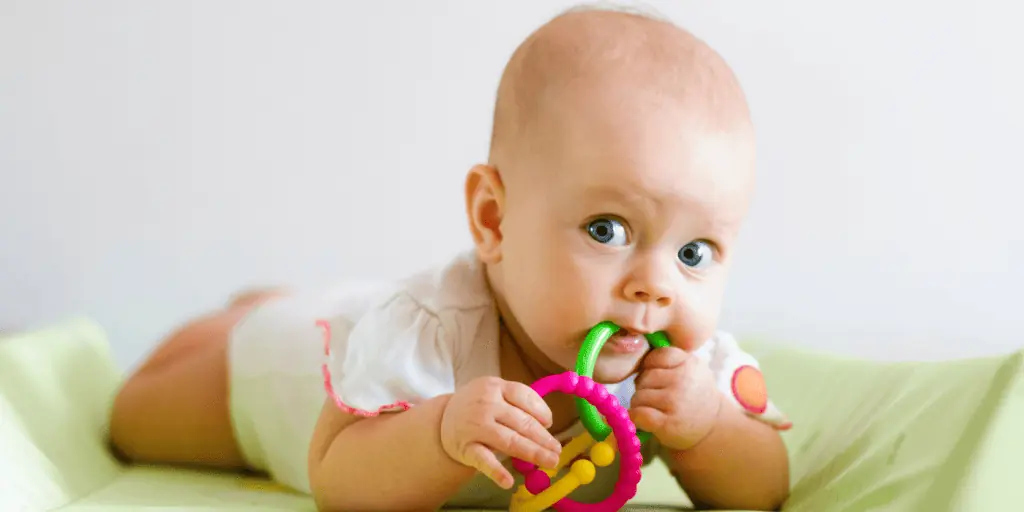Welcome to the nurturing journey of motherhood! If you’re a new mother and have chosen to breastfeed, you’re providing your newborn with essential nutrients and a unique bonding experience.
However, a common concern that often surfaces is newborn biting while nursing. It can be surprising, and yes, sometimes a little painful.
But why does this happen, and how can you gently guide your baby towards more comfortable feeding habits?
Let’s delve into the causes and explore practical solutions to manage this natural but challenging stage of breastfeeding.
Understanding Newborn Biting While Nursing
Newborns often engage in a behavior that leaves breastfeeding moms puzzled and occasionally with sore nipples – babies bite. Understanding the reasons behind this conduct can assist in mitigating the effects and potentially prevent it from occurring.

Teething and Biting- Why do babies bite?
One of the most common reasons why a baby bites is due to teething. The process of new teeth breaking through the baby’s gums can cause discomfort, and biting provides a method of relieving pain. During a nursing session, if you feel teeth against your breast tissue, the baby might be about to bite.
When this happens, it’s crucial to remember that this is a passing phase until baby’s teeth come through, and with a little persistence, most moms find ways to manage.
Try distracting them with some teething toys, and ensure that they have plenty of sensory toys for this mouthing and biting phase, when your baby is trying to put everything into their mouth.
Baby’s Mouth, Sensory Development and Exploration
Babies are naturally curious and love exploring their environment, especially using their mouth. For instance, an older baby might bite to feel the sensation of the breast milk popsicle against their tongue.
This exploration also aids in the sensory development of a baby’s mouth, teaching them different textures and sensations. In these instances, a baby bit may simply mean they are learning and experimenting.
Discomfort Can Lead to Biting
Discomfort, like a stuffy nose or an ear infection, can make a baby irritable and likely to bite (though not all babies). When babies have a cold or an ear infection, nursing may be too much stimulation feel different to them. If the milk flowing is slow due to hormonal birth control methods or if they aren’t hungry anymore, a baby might bite to stimulate more milk flow.
Breastfeeding is a wonderful bonding experience between a mother and her newborn. And breastfeeding can even ease teething pain. However, sometimes newborns can bite while actively nursing them, causing discomfort and pain for the mother. There are several reasons why a newborn may bite while nursing:
Poor latch: A poor latch can cause a baby to bite while nursing. If the baby is not latched on properly, they may bite down on the nipple to try and hold on.
Distracted: Newborns are easily distracted, and if there is a lot of noise or activity around them, they may bite down to try and get your attention.
Teething: When a baby is teething, they may bite down on anything to try and relieve the pain and pressure in their gums. This can include a mother’s nipple while nursing.
Fullness: When a baby is full, they may bite down as a way to signal that they are done nursing.
If your newborn is biting while nursing, it is important to address the issue as soon as possible. Not only can it be painful for the mother, but it can also cause damage to the nipple and affect milk supply. By identifying the cause of the biting, you can take steps to prevent it from happening in the future.
Preventing Biting While Nursing
Biting while nursing can be a painful and frustrating experience for new mothers. Fortunately, there are several ways to prevent your newborn from biting while nursing:
Ensure Proper Positioning: Poor positioning can cause your baby to bite while nursing. Make sure your baby is positioned correctly, with their mouth covering the entire areola, not just the nipple.
Pay Attention to Your Baby: Watch your baby closely while nursing, and be alert for any signs that they may be getting distracted or losing interest in nursing. If you notice any signs of distraction, take a break and try again later.
Be Mindful of Milk Supply: Your baby might bite if your milk is flowing too fast or if it isn’t flowing fast enough. Try adjusting your position or massaging your breasts to increase milk flow.
Use a Teething Toy: If your baby is teething, provide them with a teething toy to chew on before and after nursing. This can help relieve some of the discomfort and prevent them from biting while nursing.
By following these tips, you can help prevent your newborn from biting while nursing and make the experience more enjoyable for both you and your baby.

Dealing with Biting While Nursing
Immediate Response When Baby Bites
If your newborn bites while nursing, it can be a surprise and painful. The first thing to do is to immediately remove your baby from your breast. This will stop the biting and prevent further pain or injury.
Next, take a moment to assess the situation. If your baby is crying or upset, try to soothe them with gentle pats or rocking. If they seem calm, you can continue nursing on the other breast or offer a pacifier or teething toy to distract them.
If you notice any damage to your nipple or breast, such as bleeding or cracks, clean the area with warm water and apply a lanolin cream or nipple balm to promote healing.
Best Nipple Balm

Lanolin Cream
Suffered a nasty bite or friction irritation? This bestselling nipple cream is designed to help your nipples heal faster
Best Protection

Nipple Shields
These nipple shields protect your nipples when they are most painful, allowing your nipples to heal and preventing further damage
Long-term Solutions
If your newborn continues to bite while nursing, it may be a sign of an issue with their latch or oral restrictions such as a tongue tie. Consider consulting with a lactation consultant or pediatrician to evaluate your baby’s feeding habits and oral health.
Another long-term solution is to encourage your baby to open their mouth wider while nursing. This can be done by adjusting your position or using a nursing pillow to support your baby’s head and neck actively feeding. You can also try gently stroking your baby’s cheek to encourage them to open their mouth wider.
It’s important to remember that newborn biting while nursing is a common issue that many mothers face. With patience and persistence, you can find a solution that works for you and your baby.
FAQS for Newborn Biting During Breastfeeding
How do I get my newborn to stop biting while nursing?
To get your newborn to stop biting while nursing, try the following strategies:
Ensure proper latch: Make sure your baby has a good latch by opening their mouth wide and getting as much of the areola in their mouth as possible.
Pay attention to cues: If you notice your baby is about to bite, gently press their face into your breast. This will make them open their mouth to breathe, thus releasing the nipple.
Break the latch: If your baby bites down, gently insert your finger into the corner of their mouth to break the latch and protect your nipple.
Provide teething relief: If your baby is teething, offer teething toys or other methods of relief before nursing to help reduce biting.
How do I stop my baby from clamping down while breastfeeding?
To stop your baby from clamping down while breastfeeding, try these tips:
Encourage a proper latch: Ensure your baby has a deep latch with a wide-open mouth.
Stay relaxed: Maintain a calm and relaxed environment during breastfeeding.
Monitor their suckling pattern: Pay attention to changes in their suckling pattern, which may indicate that they are about to clamp down.
Distract them: Gently stroke their cheek or talk to them to keep them focused on nursing.
Why is my baby biting while breastfeeding?
Babies may bite while breastfeeding for various reasons, such as teething, poor latch, or trying to get your attention. It’s essential to identify the cause and address it accordingly.
Why is my newborn aggressive while breastfeeding?
Newborns may appear aggressive while breastfeeding due to hunger, frustration, or difficulty latching. Ensure your baby’s position is well-positioned, has a proper latch, and offer the breast frequently to address these issues.
How do I get my 4-month-old to stop biting my nipples?
To stop your 4-month-old from biting your nipples, try the following:
Ensure proper latch and positioning.
Offer a teething toy before nursing if they are teething.
Be attentive to their cues and intervene if necessary.
Use positive reinforcement by praising your baby when they nurse without biting.
Is it normal for a baby to bite off your nipple? Could it be my milk supply?
No, it is not normal for a baby to bite off your nipple. While biting can occur, particularly older babies and during teething, it’s essential to address the issue promptly to prevent injury and ensure a positive breastfeeding experience.
Sometimes babies will clamp down to stimulate more milk if there is slow milk flow- it doesn’t necessarily mean any issues with your supply.
Why does my newborn clamp down when latching?
A newborn may clamp down when latching due to a shallow latch, discomfort, or difficulty maintaining suction. Ensure your baby is well-positioned and has a proper latch to avoid clamping down. If the issue persists, consult a lactation consultant or your pediatrician for guidance.
Ensure a deep latch, where your baby takes a mouthful of breast tissue rather than just the nipple. baby’s tongue should be stimulating supply from underneath. If the latch isn’t great, take a deep breath, unlatch and try again






